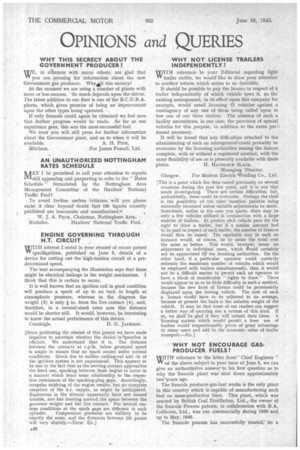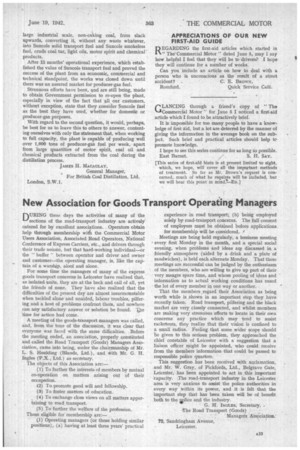OPINIONS and QUERIES
Page 32

Page 35

If you've noticed an error in this article please click here to report it so we can fix it.
WHY THIS SECRECY ABOUT THE GOVERNMENT PRODUCER?
in cOmmon with many others, are glad that " you are. pressing for information about the new Government gas producer. Whyiill this secrecy?
At the moment we are using a rinmber of plants with more or less success. 'So much depends upon the driver. The latest addition to our fleet is one of the B.C.U.R.A. plants, which gives promise of being an improvement upon the other types being operated.
If only Suncole could again be obtained we feel sure• that further progress would be made. So far as our experience goes, this was the most-successful fuel.
We trust you will still press for further information about the Government plant, and as to when it will be available. A. H. PINE, Mitcham. For James Pascal], 4d.
AN UNAUTHORIZED NOTTINGHAM RATES SCHEDULE
NAAy I be permitted to call your attention to reports
still appearing and purporting to refer to the "Rates Schedule" formulated by the Nottingham Area Management Committee of the Hauliers' National Traffic Pool?
To avoid further useless 'criticism will •you please make it clear beyond doubt that th'e figures recently published are inaccurate and unauthorized.ei W. J. A. PECK, Chairman, Nottingham Area, Rushden. Hauliers' National Traffic Pool.
ENGINE GOVERNING THROUGH H.T. CIRCUIT ,
WITH interest I noted in your r6sume of recent patent WY specifications, published on June 5, details of a device for cutting out the high-tension circuit at a predetermined speed.
The text accompanying the illustration says that there might he electrical leakage in the weight mechanism, I :think that this is certain to occur.
It is well known that an ignition coil in good condition will produce a spark of up to an inch in length at atmospheric pressure, whereas in the diagram the weight (3) is only i in. from the live contact (4), and, therefore, in a normal-sized rotor arm this distance would be shorter still. It would, however, be interesting to know the actual performance of this device.
Cranleigh‘ D. G. JACKSON.
LSince publishing the résumé of this patent we have made inquiries to ascertain whether the device in 'question is efficient, We understand that it is. The distance between the contacts at r.pin. below governed speed is ample to ensure that no spark occurs under normal conditions. Shock due to sudden cutting-out and -in of the ignition system is not experienced. This appears to be due to the fact that as the moving contact approaches the fixed one, sparking between them begins to occur in a manner which bears some relationship to the respective resistances of the sparking-plug gaps. Accordingly, irregular misfiring of the engine results, but no complete cessation of the h.t. supply, as might be anticipated. Explosions in the silencer apparently have not caused trouble, nor has burning around the space between the governor weight and the live contact. For several reasons conditions at the spark gaps are different in each
cylinder. Compression pressures are unlikely to be exactly the same, and the distances between the points will vary slightly.—TEcn. En.] ,A30
WHY NOT LICENSE TRAILERS INDEPENDENTLY?
wpm reference to your Editorial regarding light " trailer outfits, we would like to draw your attention to another reform which seems to us desirable.
It should be possible to pay the licence in respect of a, trailer independently of which vehicle tows it, as the existing arrangement, in its effect upon this company for example, would entail licensing 12 vehicles against a contingency of any one of them being called Upon to tow one of our three trailers. The absence of such a facility necessitates, in our case, the provision of special vehicles for this purpose, in addition to the extra per:.. sonnel necessary.
It will be found that any difficulties attached to the administering of such an arrangement could probably be overcome by the licensing authorities issuing the licence complete, with or without a registered number, with the same flexibility of use as is presently available with trade
plates. H. HAVELOCK SLACK, Managing Director, Glasgow. For Modern Electric 'Welding Co., Ltd.
[This is a point which has lAen raised previously on several occasions during the past few years, and it is one that needs investigating. There are certain difficulties, but, undoubtedly, these could be overcome. Perhaps the chief is the possibility of the total taxation payable being materially increased unless suitable adjustments be made. Sometimes, unlike ip the case you quote, there may be only a few vehicles utilized in conjunction with a large number of trailers. At present each vehicle pays for the right to-draw a trailer, but if a similar amount had to be paid in respect of each trailer, the number of licences would then be. raised. The equitable way in such an instance would, of course, be to make the total cost the same as before. This would, however, mean an adjustment in individual. cases, which 4ould certainly not be appreciated by the licensing authorities. On the other hand, if a particular operator could correctly estimate the, maximum number of vehicles which would he employed with trailers simultaneously, then it would not be a difficult matter to permit such an operator to have a block of transferable " rights to draw." There would appear to us to be little difficulty in such a method, because the new form of licence could be prominently displayed upon the towing vehicle. The cost of such a licence would have to be adjusted to an average, because at present the basis is the unladen weight of the vehicle. It may be that some of our readers can suggest a better way of carrying out a system of this kind. If so, we shall be glad if they will submit their ideas. A licensing system which would permit a freer use of trailers would unquestionably prove of great advantage to many users and add to the economic value of trailer transport.—En.]
• WHY NOT ENCOURAGE GAS. PRODUCER FUELS?
WITH reference to the letter from" Chief Engineer " mi the above subject in your issue of June 5, we can give an authoritative answer' to his first question as to why the Suncole plant was shut down approximately two years ago.
The Suncole producer-gas-fuel works is the only plant in this country which is capable of manufacturing such fuel on mass-production lines. This plant, which was erected by British Coal Distillation, Ltd., 0 the owner Of the Suncole Process patents, in collaboration with B.A. Collieries, Ltd., was run commercially during 1939 and up to May, 1940.
The Suncole process has successfully treated, on a large industrial scale, non-caking coal, from slack upwards, converting it, without any waste whatever, into Suncole solid transport fuel and Suncole smokeless fuel, crude coal tar, light oils, motor spirit and chemical' products.
After 15 months' operational experience, which established the value of Suncole transport fuel and proved the success of the plant from an economic, commercial and technical standpoint, the works was closed down until there was an assured market for producer-gas fuel.
Strenuous efforts have been, and are still being, made to obtain Government permission to re-open the plant, especially in view of the fact that all our customers, without exception, state that they consider Suncole fuel as the best they have used, whether for domestic or producer-gas purposes.
With regard to the second question, it would, perhaps, be best for us to leave this to others to answer, contenting ourselves with only the statement that, when working to full capacity, the plant is capable of producing well over 1,000 tons of producer-gas fuel per week, apart from large quantities of motor spirit, coal oil and chemical products extracted from the coal during the distillation process.
JAMES H. MACAULAY,
General Manager, For British Coal Distillation, Ltd.
London, S.W.I.
APPRECIATIONS OF OUR NEW FIRST-AID GUIDE REGARDING the first-aid articles which started in " The' Commercial Motor" dated June 5, may I say how helpful I feel that they will be to drivers? I hope they will continue for a number of weeks.
Can you include an article on how to deal with a person who is unconscious as the result of a street accident? . C. E. BROWN, Romford, Quick Service Café.
GLANCING through a friend's copy of "The Commercial Motor" for June 5 I noticed a first-aid article which I found to be attractively brief.
It is impossible for too many people to have a knowledge of first aid, but a lot are deterred by the manner of giving the information in the average book on the subject. Such brief and practical articles should help tc promote knowledge.
I hope to see this series continue for as long as possible.
East Barnet. S. H. SAY.
[This series of first-aid hints is at present limited to eight, which, we hope, will cover all the important methods of treatment. So far as Mr. Brown's request is concerned, much of what he requires will be included, but we will bear this point in mind.*—En.]




















































